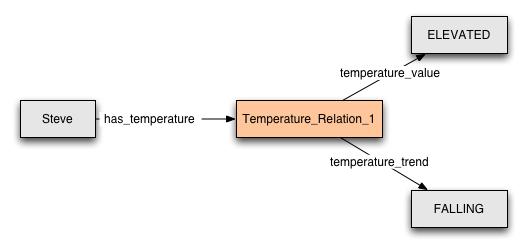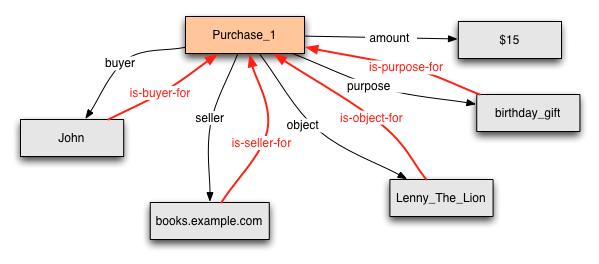Duane --
You make some good points, below.
There is actually a solution to the problems that you raise.
That is to recognize that graph diagrams, although having immediate
visual appeal, don't carry enough information for actual question
answering applications. (Example: Is John -- the Buyer -- aware of the
price?)
On the other hand, it's quite practical to write down all the needed
information as rules in executable English, then to run the rules to
answer questions. [1]
*After* doing that, one could drop much of the necessary detailed
information, and put the remainder in a graph that gives a quick
overview of the kind of information that is being processed.
The lack of adequate information for question answering may in fact be
something of a bottleneck for wider practical use of ontologies. What
do folks think?
Cheers, -- Adrian
[1] See e.g.
http://www.reengineeringllc.com/demo_agents/RDFQueryLangComparison1.agent
http://www.reengineeringllc.com/demo_agents/FeaReferenceModelOntology1.agent
--
Internet Business Logic -- online at www.reengineeringllc.com
Reengineering LLC, PO Box 1412, Bristol, CT 06011-1412, USA
Phone 860 583 9677 Mobile 860 830 2085 Fax 860 314 1029
Duane Nickull wrote:
I split
this out as a separate thread.
One thing that is very ambiguous about the use of the concept maps and
OWL is the exact nature of several of the relationships.
Given the attached diagram entitled "temperature-example", there are
several questions that are unanswered. I find the whole set of
examples flawed.
Steve has a temperature? No - that is wrong! Yes - Steve has a
temperature, however we cannot ever be sure what it is. A much more
accurate statement is that Steve was associated with an event where
someone (part of an agency) measured his temperature. They did this
using a procedure (tested it with a thermometer stuffed under his
tongue for 30 seconds), possibly an instrument (type and brand of
thermometer) and it was conducted at some geo-spatial coordinates. The
example given is worthless if you get more than one declaration since
you would need the extra information to determine which set of
information is more accurate a current. How can you say he has a trend
without knowing the time attributes? Is a digital, infrared
thermometer pointed at the back of Steve's throat given the same
"weight" of accuracy as his mother feeling his forehead? I think not.
This is almost as flawed as the Protege groups' Wine example.
The second diagram entitled purchase example inverse also raised some
issues IMO. An inverse relationship is no where hear robust enough.
The SUMO model is the one they need to consider. SUMO is the only
ontology i have seen that seems to cover all the possible range of
types of binary associations. It is not clear from the concept map if
the relationships are able to determine simple things like is the buyer
even aware of the purchase assuming the red inverse arrow was not
present. The N to N relationships discussion on the other thread would
encompass the nature of all relationships beyond the immediate binary
predicates. Example: Is John (the Buyer) aware of the price? No one
has published a convention for interpreting concept maps that clarifies
this. Can OWL clarify this? Does the awareness traverse across
multiple nodes? If John is the buyer role of the transaction, is he
automatically aware of all the aspects of the purchase? I find it
unnecessary that "birthday gift" is an aspect of the purchase concept
itself. I would presume that such a reason is a factor associated only
with John in his role as Buyer as a motivating factor.
Duane


_________________________________________________________________
Message Archives: http://ontolog.cim3.net/forum/ontolog-forum/
Subscribe/Unsubscribe/Config: http://ontolog.cim3.net/mailman/listinfo/ontolog-forum/
Shared Files: http://ontolog.cim3.net/file/
Community Wiki: http://ontolog.cim3.net/wiki/
To Post: mailto:ontolog-forum@xxxxxxxxxxxxxxxx
--
Internet Business Logic -- online at www.reengineeringllc.com
Reengineering LLC, PO Box 1412, Bristol, CT 06011-1412, USA
Phone 860 583 9677 Mobile 860 830 2085 Fax 860 314 1029
|
|